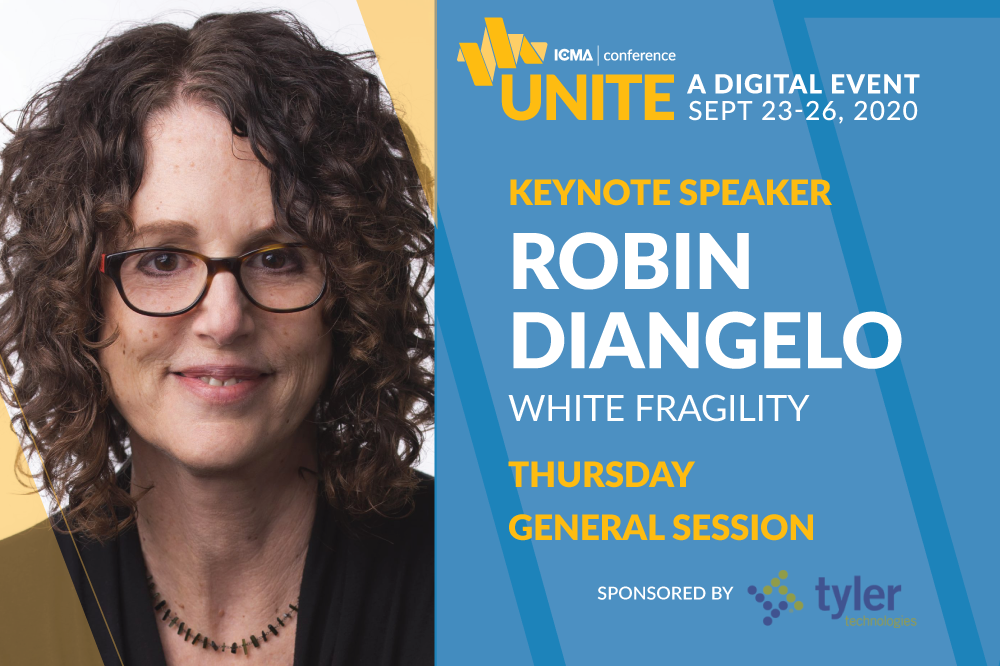
White Fragility
“I want to start by drawing your attention to my race. Right out of the gate. It’s a very uncomfortable thing for me to be doing.” Robin DiAngelo, PhD and affiliate associate professor of education at the University of Washington, Seattle, wasted no time jumping right into the sensitive and controversial topic of White Fragility during her Thursday keynote session, sponsored by Tyler Technologies, at ICMA's digital event, UNITE.
“I’m white. I have a white frame of reference, a white world view, a white experience,” she said.
DiAngelo said everyone has an opinion on race and racism, but that does not make it informed. Furthermore, she explained it is difficult to have an informed opinion when these issues are not openly talked about, when we aren’t given good information in school, and when we don’t know our own history.
Attendees were asked to engage with openness and humility and that the goal for white viewers of the keynote session wasn't the typical misconception of trying to understand the minority perspective, but instead, in the words of Ijeoma Oluo, "I don’t want you to understand me better, I want you to understand yourselves. Your survival has never depended on your knowledge of white culture, in fact it’s required your ignorance."
The Systemic Nature of Racism
What is the mainstream definition of a racist? DiAngelo explained the widely accepted definition is an individual who consciously does not like people based on race and is intentionally mean to them. “This definition protects the system of racism. Which exempts virtually all white people from the system and is the root of white defensiveness.”
DiAngelo noted systemic racism is the real problem and it goes well beyond any individual or small group’s bias.
“Systemic racism is when one group’s collective bias is backed with legal authority and institutional control. That transforms it into a far-reaching system that gets imbedded and infused across the entire society in every organization, policy and practice, in cultural definitions,” she said. “It becomes the default because the group that controls those institutions automatically infuses their biases.”
Statistics illustrating white domination of positions of power were shared:
- Presidency: 99 percent white
- Vice Presidency: 100 percent white
- Senate: 91 percent white
- House: 73 percent white
- Governors: 98 percent white
- Mayors: 88 percent white
- Military Advisors: 100 percent white
- Police Officers: 80 percent white
- Television Execs: 93 percent white
- News Execs: 85 percent white
- Teachers: 82 percent white.
“It’s not about numbers. It’s about power,” DiAngelo said.
After noting that out of top 100 grossing US films of all time, 99 were directed by men and 95 were directed by a white person, DiAngelo explained problematic outcomes of racial perspective by contrasting two well-respected directors, the black Spike Lee, and the white Mike Leigh.
“We mark Spike Lee’s race, but not Mike Leigh’s. This grants Mike Leigh objectivity, individuality, and universality. Spike Lee is always seen as biased and limited in his perspective,” she said.
“Racism is a system, not an event.”
According to DiAngelo, it is not if, but how each person has been shaped by the forces of racism. She quoted Ibram X. Kendi who said, “The opposite of racism isn’t not racist. It’s anti-racist.” She further explained anti-racist must be active.
“The default of society is the reproduction of racism. If you are not doing anything actively to interrupt that default, you are supporting and colluding with it. That is why we say white people automatically benefit from this system. If they don’t challenge it, they are participating in the system,” she said.
A Framework to Change
While there clearly is no magic or quick solution to any of these issues, DiAngelo laid out a framework toward change that doubled as the key takeaways to her presentation:
- Recognize racism is a multilayered, complex, hierarchical system infused across society.
- Nothing has excepted any of us from this.
- Everyone has bias, most is unconscious. If someone wants to help us see it, be open and curious instead of angry and defensive.
- Racism occurs when one group’s bias is backed with power and control.
- Thinking in terms of good people versus bad people is not constructive. Change the question from "if" we have been shaped by racism forces to "how."
- No one is objective on racism, white people most of all because the system serves us.
- Learning is never finished. Listen, reflect, grapple, take in.
- Awareness without action is meaningless.
DiAngelo closed her session by imploring everyone to break the apathy and take action. Then she reflected on her own process.
“This is the most transformative, liberating journey. Hard and painful at times, but the status quo is more uncomfortable.”
Want more?
Registration for UNITE: A Digital Event is still open! All sessions* will be available on-demand through December 31, 2020. Register today!
*This keynote session with Robin DiAngelo is only available to view through Saturday, September 26.
New, Reduced Membership Dues
A new, reduced dues rate is available for CAOs/ACAOs, along with additional discounts for those in smaller communities, has been implemented. Learn more and be sure to join or renew today!
